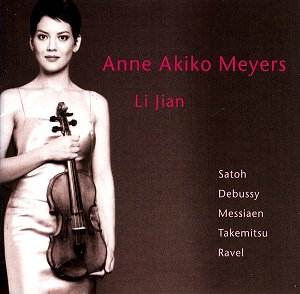With dozens of fine
recordings of the sonatas of Debussy
and Ravel available, a record label
needs one of two things to justify another
release: a star performer with a unique
interpretation, or some interesting
filler works to make the duplication
worthwhile. Avie, in this impressive
release by Anne Akiko Meyers and Li
Jian, have lots of the former, and enough
of the latter to make it work.
Opening with Somei
Satohís Birds in Warped Time II,
Ms. Meyers and Mr. Li set an atmospheric
stage, one that entices us to listen.
A dreamy, new-agey piece of ear candy,
this is a work that runs out of ideas
before it runs out of notes. Nonetheless,
the performers deliver a sincere rendition,
and there is a relaxing, ethereal quality
to the playing. The best, though, is
yet to come.
Little need be said
about the merits of the sonatas by impressionist
masters Claude Debussy and Maurice Ravel.
They have long been established in the
repertoire, and I for one will say without
hesitation that they are two of the
greatest works in the genre. Why then,
record them again. In this case, the
answer is self-evident. Ms. Meyers and
Mr. Li play them with a Parisian panache
that is breathtaking. Urgent, playful
and oh-so refined, these are some of
the finest readings that I have ever
heard of what are indeed two of my favorite
pieces of chamber music. These performances
capture beautifully the spirit of the
café society of the roaring twenties.
Of particular merit is the manner with
which Ms. Meyers handles the bluesy/jazzy
elements of the pieces. The second movement
of the Ravel is in points downright
racy. This is quite an accomplishment.
Rounding out the program
is an early Theme and Variations set
by Olivier Messiaen, who in his later
years was consistently guilty of long,
rambling and self-indulgent works that
were veiled in the cloak of mysticism.
This is a taut work and the influence
of Ravel is obvious. Lyrical and to
the point, it is a worthy piece and
a nice, well-executed addition to this
recital.
Toru Takemitsu is famously
quoted as saying that the Japanese do
not understand "allegro."
Thus, much of his music is calm and
slow of tempo. The 1951 Distance
de Fée (Distant Fairy) is
one of several pieces from the composer
that deal with the concept of distance
and space. Although it is evocative
of some dream-like landscape, it does
hold the listenerís interest with enough
forward motion to keep it from becoming
stagnant. Brief but effective, it is
beautifully played.
Avie, if they are indeed
trying to become a major player in the
classical record market, are certainly
going about it in all the right ways.
Excellent production values abound here
with top-notch sound quality, literate
and interesting liner notes and in general,
attractive packaging. Thus far, all
of the discs that have come my way from
this company have been consistently
world-class, and if this is a harbinger
of things to come, the classical music
world has a welcome new major player.
This disc is highly recommended.
Kevin Sutton
Jonathan
Woolf also listened to this recording
